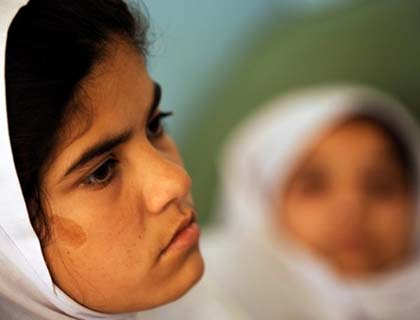“I don’t know why I suffer so much humiliation in my house. Honestly speaking, my mother has no compassion for me. During the last years of my childhood, she never allowed me to mix with my friends and always stopped me from attending any kind of function arranged by my friends or even by my school.”
Despite the progress made, women’s struggle for civic and human rights still has a long way to go. Three decades of war has left many Afghans both eager for change and afraid of it. There are still many instances of ordinary women experiencing domestic violence and discriminations, precluded from attending schools in traditional areas, being sexually abused, or being forced into marriage. Women in senior leadership roles – such as in parliament or the police – are still being murdered. Some men feel threatened by the presence of women in senior positions. These men see women’s rights as the “westernization” of Afghan culture and a threat to Islamic values.
Zieba Shorish-Shamley rightly reflects the state of Afghan women in her poems, “They made me invisible, shrouded and non-being. A shadow, no existence, made silent and unseeing. Denied of freedom, confined to my cage! Tell me how to handle my anger and my rage?”
Radical feminists believe that women cannot get rid of sexual cruelties and atrocities by gradual changes and amendment. According to them, patriarchy is a systemic phenomenon; gender equality is possible only by demolishing the system of patriarchy. They believe that those social and cultural norms which reiterate the slender figures and sympathetic attitudes of women, aim to extend their inferiority and obedience. According to this type of feminism, objectifying women through media, models and advertisements change women to sexual objects with the intention of amusing and pleasing men.
Seema, an Afghan girl, complains that why her mother restrains only her and not her brother. Her brother enjoys all sorts of facilities. He goes everywhere and does everything. Seema believes that her mother is taking some sort of revenge on her, maybe of her own past. She says, “Whatever her mother did to her, she is doing exactly the same to me. But why? She adds that there are many factors behind it but illiteracy is the most important among them.
An English writer and thinker Rushkin said that the purpose of being educated is not to be learned but to love learning, not merely to be just but to love justice. Bookish knowledge is not enough for someone to be called an educated person. Education must reach the deepest core of human nature and make the person a better human being. The aim of education is not merely to pour ready materials into one’s head but to make him/her think for themselves and to discover new things. Qualities like justice, truths, honesty, generosity, self-sacrifice and feelings for our fellowmen are cultivated by education. A large number of us claim to be educated but we are not educated till our hearts get softer, our minds firmer and our spirit ennobled.
Islam clearly says that it is the duty of every Muslim male and female to acquire education. However it is the height of selfishness on part of our men who fully take advantage of a good education but deny the same to women. It is argued that women have their domestic duties to perform and it they were educated, they would bury themselves in their books and would have little time for attending to their household chores. I believe that it is not correct, education would help them in performing their duties at home in better way. They would make better mothers, having the ability to read books on nutrition, home management and child psychology. This definitely results in a happy and healthy home.
To let women remain uneducated is to jeopardize future generations and hence future progress. An uneducated woman will unconsciously injure her children in countless ways.
The present state of ignorance and illiteracy among women is further endangering their already precarious position in this fast developing world. Every possible effort should be done to speed up the education of Afghan girls. We need more female teachers, female doctors, lawyers and social workers. Our need is not only this but we also want more education families better than their uneducated sisters and can produce better people.
Education is the best strategy to liberate women from male domination. Investing in girls’ education is critical to addressing girls’ needs and concerns as well as human rights. It has been shown that girls who go to school and stay in school are more likely to find jobs as adults, get married older, have fewer children, and are able to earn more for their families and communities. Beyond protective security measures, the only way to ensure women’s human rights in Afghanistan and to truly empower women in the long run is through offering primary, secondary, and higher education that will foster literacy, free-thinking, and knowledge of international human rights standards.
Let us hope that, “The day will come when man will recognize woman as his peer, not only at the fireside, but in councils of the nation. Then, and not until then, will there be the perfect comradeship, the ideal union between the genders that shall result in the highest development of the race.”

